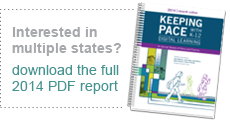Data & Information
South Carolina
South Carolina has a state virtual school, the South Carolina Virtual School Program (SCVSP); seven online charter schools; and several district programs.Fully online schools
The seven online charter schools—Palmetto State E-cademy, South Carolina Connections Academy, South Carolina Virtual Charter School (operated by K12 Inc.), South Carolina Calvert Academy, and Provost Academy South Carolina—had a total of 8,877 students enrolled in SY 2013-14.
The South Carolina Public Charter School District (SCPCSD) approves virtual charter school applications; all virtual charter school online courses must be reviewed and approved by the Department of Education as one of the last steps in charter school authorization. There are no enrollment limits for charter schools, though there are restrictions detailed in the policy history below. The SCPCSD is one of the first charter authorizing agencies in the country to be an LEA (local education agency) as well as a charter authorizer. Virtual charter schools are funded by the same formula applied to all charter schools in the state; funds are distributed by the SCPCSD.
State virtual school
The South Carolina Virtual School Program (SCVSP; the state virtual school) had 24,491 enrollments in school year 2013-14, a 46% annual increase. SCVSP was established by Act 26 (2007), and expands with the passage of H3752 in 2013. H3752 lifts the cap of three online credits allowed per student per year, allows students in grades 8-12 (expanding to 6-12 by SY 2014-15) to take unlimited courses via SCVSP, and expands course listings to include more electives and AP courses. SCVSP is available to all students under age 21, including adult education, private school, and homeschooled students. It had a budget of $3 million in SY 2012-13. For $3,500 per course, SCVSP offers a curriculum and certified teacher to schools that need an in-demand course or a teacher in a particular area.
District programs
Horry County School District is implementing a district-wide Personalized Digital Learning initiative in its middle and high schools, with plans to expand to its elementary schools. One of its schools, Whittemore Park Middle School, launched a 1:1, blended learning, competency-based initiative supported in part by a Next Generation Learning Challenges grant.
Online learning policy history
2007: Act 26 formally established the SCVSP. The bill makes the SCVSP available to all students under age 21, including private school and homeschool students, and limits students to three online credits per year and 12 throughout high school.
Act 26 also allows online charter schools but with the following restriction: “no more than seventy five percent of a student’s core academic instruction in kindergarten through twelfth grade [may occur] via an online or computer instruction program.” The law states that the 25% of non-online instruction can be accomplished through “regular instructional opportunities in real time that are directly related to the school’s curricular objectives, including, but not limited to, meetings with teachers and educational field trips and outings.” The terms “online,” “computer instruction,” and “real time,” were not clearly defined by legislature during the passing of the law, allowing some confusion between real time and online. The South Carolina Department of Education clarified the law by issuing guidance as to what instructional methods meet the requirement for “regular instructional opportunities in real time” to include web conferencing, audio conferencing, field trips, face-to-face group meetings, and student clubs in academic areas.308 By including web conferencing and audio conferencing, the Department maintained the ability of full-time online schools to meet the law’s requirements without significant changes to their instructional methods.
Following are some of the requirements specific to virtual charter school applicants per Act 26: “If the governing body of a charter school offers as part of its curriculum a program of online or computer instruction, this information shall be included in the application and the governing body shall be required to . . .”:
- “Ensure that a parent or legal guardian of each student verifies the number of hours of educational activities completed by the student each school year.”
- “Adopt a plan by which it will provide:
– “Frequent, ongoing monitoring to ensure and verify that each student is participating in the program, including proctored assessment(s) per semester in core subjects graded or evaluated by the teacher, and at least bi-weekly parent teacher conferences in person or by telephone;”
– “Regular instructional opportunities in real time that are directly related to the school’s curricular objectives, including, but not limited to, meetings with teachers and educational field trips and outings.”
– “Administer to all students in a proctored setting all applicable assessments as required by the South Carolina Education Accountability Act.”
– “Private or homeschool students choosing to take courses from a virtual charter school may not be provided instructional materials, or any other materials associated with receiving instruction through a program of online or computer instruction at the state’s expense.”
Blended learning
South Carolina Science Academy is a fully blended school that opened in fall 2013 and serves grades 6-8.
last updated October 8, 2014
back to map


